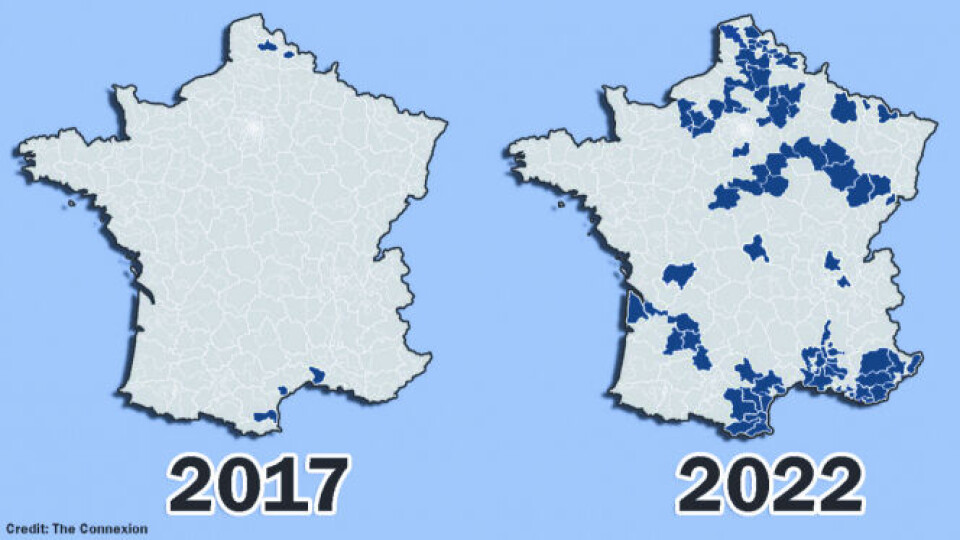-
Hosting scheme in south-west France lets newcomers sample lifestyle
Households in nine Dordogne communes volunteer under Mes Nouveaux Voisins scheme
-
French boulangeries demand right for staff to work on May 1 so they can open
Artisan bakery owners can work but employees cannot, while certain industrial bakeries are allowed to remain open with workers
-
How many Americans live in Paris - and where else are they choosing in France?
Over a quarter of all US nationals in France live in the capital city
MAP: Which areas of France have elected the 89 new far-right MPs?
The record (and surprise) score of Marine Le Pen’s party means it will form a much larger parliamentary group. Many of the seats were not in traditional RN strongholds

The far right is gaining considerable strength in the French parliament as 89 deputies (MPs) of the Rassemblement National (RN) were elected yesterday (Sunday 19 June) in the second round of France’s legislative elections.
Read more:Macron misses out on absolute majority in French legislative elections
The score is being hailed as ‘historic’ for the party of Marine le Pen, which multiplied its result of 2017 by 11 (in 2017 they had 8 MPs). It will now be able to constitute the most powerful group in the Assemblée Nationale in the history of its movement. It will have more MPs than the right-wing Les Républicains (LR) party.
The RN’s previous record was 35 deputies in 1986. After that its scores in the legislatures have been low at 0 in 2002 and 2007, 2 in 2012 and 8 in 2017.
It is not the highest challenge, though, to President Macron’s coalition - that comes from the other end of the political spectrum with the new left-wing coalition dominated by a young intake of Jean-Luc Mélenchon supporters Nupes. Nupes won 131 seats to Macron’s Ensemble! coalition of 245 seats. The split means Mr Macron is far from having an absolute parliamentary majority.

Four departments now have 100% Rassemblement National MPs
Four departments have elected 100% far-right deputies. These are Haute-Marne, Haute-Saône, Aude and Pyrénées-Orientales.
The RN also confirmed its progress in Vaucluse, winning four of the five constituencies in this department, which had only one far-right MP. The department now has 80% of RN deputies.
In the Var, the RN won 7 of the 8 constituencies, including the 4th constituency, where Eric Zemmour had been eliminated. The Var now has 87% of Rassemblement National MPs.
"It's a meteoric rise," noted political scientist Jean-Yves Camus to FranceInfo with the RN gaining a foothold "not only in the traditionally good regions" for it, such as Hauts-de-France and the South, but also in "an arc" that stretches from Oise, Somme and Aisne to Aube and even Haute-Saône, which are either "very large suburban areas of Paris" or "landlocked, deindustrialised, ‘forgotten’ departments".
Marine Le Pen will not resume the presidency of the RN
Marine Le Pen today (June 20) announced that she will not resume the leadership of the RN. She will instead devote herself to the presidency of her parliamentary group and focus on the National Assembly.
She was speaking to BFMTV from her stronghold in Hénin-Beaumont (Pas-de-Calais). Mrs Le Pen had left the leadership of the party to Jordan Bardella since the beginning of the presidential campaign.
"I will [instead] focus on the presidency of this very large group," said the far-right presidential finalist who said she had been "surprised" by the number of RN deputies - 89, a record, as she had hoped for about 60.
What power will the RN have at the National Assembly?
Anne-Charlène Bezzina, political scientist and constitutionalist, told RMC:
"The RN will have the power to propose, amend, modify, question the government, and refer to the Constitutional Council. When you declare yourself [as] an opposition group to the president of the National Assembly, you are entitled to longer speaking time. There is a lot of visibility and possibilities to come and get the government.
It is thought that they will therefore be able to influence the national political debate with a view on the 2027 presidential election [with president Macron not being able to run a third time].
Related articles
MP elections in France: what are key policies of leading coalitions?
11 questions on the legislative elections this month in France
























